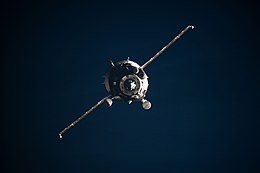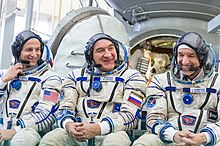
Back Sojuz MS-13 Czech Sojus MS-13 German Soyuz MS-13 Spanish سایوز اماس-۱۳ Persian Sojuz MS-13 Finnish Soyouz MS-13 French Soiuz MS-13 Galician סויוז MS-13 HE Soyuz MS-13 ID Sojuz MS-13 Italian
 The Soyuz MS-13 approaches the ISS | |
| Mission type | ISS crew transport |
|---|---|
| Operator | Roscosmos |
| COSPAR ID | 2019-041A |
| SATCAT no. | 44437 |
| Mission duration | 200d 16h 44m |
| Orbits completed | 3,216 [1] |
| Spacecraft properties | |
| Spacecraft | Soyuz-MS |
| Spacecraft type | Soyuz-MS 11F747 No. 746 |
| Manufacturer | Energia |
| Crew | |
| Crew size | 3 |
| Members | Aleksandr Skvortsov Luca Parmitano |
| Launching | Andrew R. Morgan |
| Landing | Christina Koch |
| Callsign | Cliff |
| Start of mission | |
| Launch date | 20 July 2019, 16:28:21 UTC[2] |
| Rocket | Soyuz-FG |
| Launch site | Baikonur, Site 1/5 |
| End of mission | |
| Landing date | 6 February 2020, 09:12:45 UTC[3][1] |
| Landing site | Steppes of Kazakhstan. |
| Orbital parameters | |
| Reference system | Geocentric |
| Regime | Low Earth |
| Inclination | 51.6° |
| Docking with ISS | |
| Docking port | Zvezda aft |
| Docking date | 20 July 2019, 22:47:50 UTC[1] |
| Undocking date | 26 August 2019, 03:35 UTC[4] |
| Time docked | 36 days, 4 hours and 48 minutes |
| Docking with ISS (Relocation) | |
| Docking port | Poisk zenith |
| Docking date | 26 August 2019, 03:59 UTC[4] |
| Undocking date | 6 February 2020, 05:50:28 UTC[1] |
| Time docked | 164d 1h 51m |
 (l-r) Morgan, Skvortsov and Parmitano | |
Soyuz MS-13, also designated ISS flight 59S, was a crewed Soyuz mission launched on 20 July 2019 – the 50th anniversary of the first Moon landing – [2] carrying three members of the Expedition 60 crew to the International Space Station: a Russian commander, an American flight engineer, and a European flight engineer. Soyuz MS-13 was the 142nd flight of a Soyuz spacecraft. It was at one point the last Soyuz flight contracted by NASA in the expectation that subsequent astronaut transport would be provided by the Commercial Crew Program,[5] but in early 2019, NASA sought to purchase two additional Soyuz seats to provide greater certainty given delays in that program.[6]
- ^ a b c d Cite error: The named reference
SFMS13was invoked but never defined (see the help page). - ^ a b "Запуск "Союза" к МКС перенесли по просьбе НАСА" [Soyuz launch to ISS was postponed upon NASA's request] (in Russian). RIA Novosti. 12 April 2019. Retrieved 13 April 2019.
- ^ Return
- ^ a b Relocates Russian Soyuz Spacecraft to Different Port
- ^ Harwood, William (31 August 2018). "Station crew faces busy schedule as commercial crew schedule ramps up". Spaceflight Now. Retrieved 1 September 2018.
- ^ "PROCUREMENT OF CREW TRANSPORTATION AND RESCUE SERVICES FROM ROSCOSMOS – Federal Business Opportunities: Opportunities". fbo.gov.